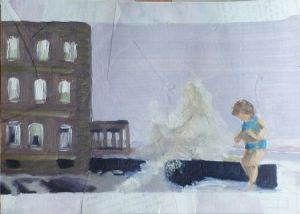
Painting as emergent knowledge: Exploring contemporary artistic labour as a process of ecological cognition
This research seeks to understand the contemporary artistic labour of painting in a ‘post aesthetic’ world, in which artistic knowledge is seen as socially situated, embodied, and emergent; existing in processes rather than artefacts. This has implications for understanding the ‘work’ of painting. Debates on artistic subjectivity and creative work ignore skilled and cognitive processes of labour (Taylor, 2011). An exception is Roberts (2007) who proposes that artistic subjectivity has become ‘decentred’, distributed across people, skills and tools. However, his labour theory does not address painting in any depth. My research explores decentred artistic subjectivity from within painting. Using a practice-led method, it explores how painting can evolve a practice in line with new norms around ‘spectatorship’, and asks how we might understand this labour. Painter-researchers have done much to understand artistic subjectivity as distributed across bodies and materials, but lack focus on ‘social’ conditions of practice. My research brings this social focus, employing a framework of ‘ecological cognition’ to develop a theory and practice of painting as emergent knowledge that unfolds in relationships between bodies, materials, the ‘social’, and the environment. It tests a new practice-led perspective for understanding creative work, exploring cognitive processes of contemporary artistic labour. It brings a ‘social’ perspective to understanding the work of artist and audience in painting as research. It develops a post-Cartesian understanding of ‘making-as-thinking’ that involves body and material interactions, rhythm and gesture. It considers the embodiment of social structures in artefacts and individual habitual practices, examining cognition as a ‘social’ process. It suggests that ‘co-responsibility’ (Bolt, 2007) encompasses artist, audience, and artefacts in meaning-making. It contributes a practical framework for sharing artwork and proposes that ‘creative labour’ (Gulli, 2005) can be a shared art of inquiry that is not just a way of knowing; it reveals social ‘being’.
Key aims:-
- To develop a situated case study of painting as inquiry which offers an account of decentred artistic subjectivity, agency and authorship, and contributes towards understanding the conditions of ‘post-aesthetic’ creative labour;
- To critique Roberts’ view of a decentred authorship aligned with general social technique (2007), and its implications for practice-led research in painting;
- To contribute an epistemological grounding for practice-led research in painting that accounts for social structures and artistic agency;
- To contribute insights to practice-led research methods, in particular ‘digital reflection’ (Kirk & Pitches, 2013).
My PhD supervisors are Professor Jonathan Pitches (lead), Dr Maria Kapsali, and Professor Calvin Taylor (previously lead supervisor, now retired). I am enormously grateful for their unstinting support and guidance.
Carole Kirk, Painter, Writer, and Cultural Industries PhD Scholar
You can contact me on mail AT carolekirk DOT com, or on Twitter @carolekirk